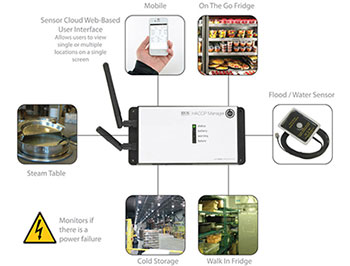Mobile Apps – an Integral Part of your FSMA Compliance Tool Chest
By Jill Bender
As we all know, the final preventive control rules for human and animal food are out and the clock has officially started ticking for companies to be compliant. And while the dialog about the Food Safety and Modernization Act (FSMA) has been primarily focused on ‘what is going to be required of my company’ it is quickly shifting to ‘how am I going make sure we’re compliant?’
If you look at what being FSMA compliant means, it really boils down to defining gaps in your current food safety systems that don’t meet the new regulations, updating your programs to fill these gaps, and the last, yet most important hurdle – ensuring implementation and ongoing program adherence backed up by comprehensive program documentation and record keeping. And that last yet critical hurdle is where food safety and quality mobile apps can have a large impact in helping companies tackle FSMA compliance head on.
Mobile apps, designed specifically for food safety and quality assurance (FSQA) program management, provide a company a multitude of opportunities to more effectively manage FSMA compliance, including:
- Ensuring food safety programs, updated to meet FSMA requirements, are being followed. As companies update their programs for FSMA compliance, there will be the challenge of ensuring new program steps are being adhered to and tasks are being completed. With mobile apps, companies can access their FSMA-required Hazard Analysis Risk-based Preventive Controls (HARPC) food safety program tasks, workflows and schedules directly from mobile apps that are tied to the host FSQA solution. These apps prompt and guide the user through required program tasks – complete with alerts for when tasks need to be completed – ensuring the right food safety tasks are taking place, at the right time, and with the most up-to-date requirements, specs and forms.
Mobile apps provide a multitude of opportunities to more effectively manage FSMA compliance.
- Supporting stronger supply chain controls by catching non-conformances earlier and managing corrective and preventive actions (CAPAs) faster. When food safety data is directly entered into an interactive mobile app, it is analyzed against requirements in real time, notifying the user immediately if there is a compliance issue. For instance, direct observations of pre-harvest produce inspection can be entered at the point of origin – or data from a plant floor for a preventive control, such as a sanitation task. If, upon analysis a non-conformance is detected, an alert is automatically sent to key stakeholders for CAPA generation – including CAPA coaching via the mobile app – and follow-up. Once the CAPA takes place, data can be re-collected at the point of origin and sent electronically to the FSQA manager for electronic, time/date-stamped record sign-off. This important functionality of FSQA mobile apps means that issues are caught and fixed at the earliest point possible – preventing non-conforming products from going to the next point in the supply chain process or into commerce.
- Providing new efficiencies in FSQA program data documentation and record keeping, for on-demand FDA inspections, records requests and audits. When FSQA data is collected via mobile apps, it’s automatically uploaded to the host FSQA solution. The collection of food safety data and completion of program tasks and associated CAPAs/actions are now part of your permanent, electronic records that can be easily accessed for auditing purposes by the FDA or essentially any other auditor – GFSI, internal or customer. And because all FSQA data is collected “once and done” at the point of origin, there’s no redundant data entry, mistakes are avoided, and there’s greater record efficacy that helps companies be audit ready, on demand.
These are just a few examples of how FSQA mobile apps facilitate better food safety program management, supply chain controls and audit readiness, all key to FSMA compliance. Yet what is perhaps one of the most compelling reasons to use mobile apps to collect all your FSQA data is the fact that you now have a centralized repository of accessible data – critical to effectively manage KPIs, trending, and ongoing, continuous improvement.
Should FSQA mobile apps be considered an integral part of your FSMA compliance toolkit? You bet. Could these mobile apps help your organization regardless of what is being dictated by FSMA? What do you think?
About the Author
As VP of Marketing for SafetyChain Software, Jill Bender works with the food industry and SafetyChain customers alike to educate and share how automation technologies, designed for food safety and quality operations, can help companies more effectively achieve their goals of delivering safe, quality food.
To have more articles like this emailed to your inbox, become a GFSR Member today!

-
 FeaturedRisk management
The Cost of a Breach: What a Cyberattack Could Mean for Food Safety Recalls
FeaturedRisk management
The Cost of a Breach: What a Cyberattack Could Mean for Food Safety Recalls
-
 FeaturedRisk management
Securing the Food Chain: How ISO/IEC 27001 Strengthens Cybersecurity
FeaturedRisk management
Securing the Food Chain: How ISO/IEC 27001 Strengthens Cybersecurity
-
 FeaturedRisk management
Revolutionizing Food Safety Training: Breaking Out of the “Check-the-Box” Mentality
FeaturedRisk management
Revolutionizing Food Safety Training: Breaking Out of the “Check-the-Box” Mentality
-
 GFSI Standards
GFSI 2025: Building Trust, Tech-Forward Solutions, and Global Unity in Food Safety
GFSI Standards
GFSI 2025: Building Trust, Tech-Forward Solutions, and Global Unity in Food Safety
-
 FeaturedFood Safety
Integrated Pest Management: Strategies to Protect Your Brand’s Reputation
FeaturedFood Safety
Integrated Pest Management: Strategies to Protect Your Brand’s Reputation
-
 FeaturedFood Safety Culture & Training
No Open Door Policy: Challenges That Impact Pest Control in Food Processing Plants
FeaturedFood Safety Culture & Training
No Open Door Policy: Challenges That Impact Pest Control in Food Processing Plants


